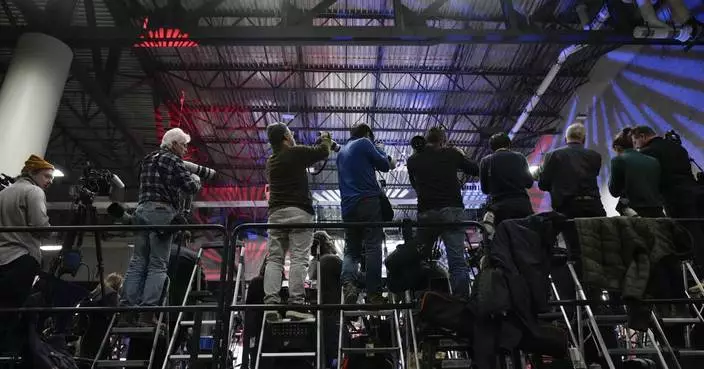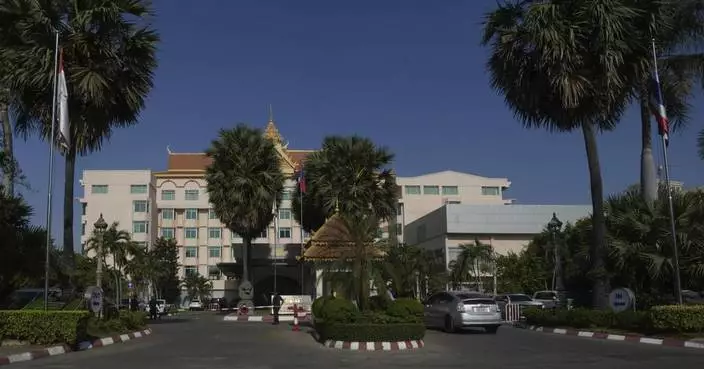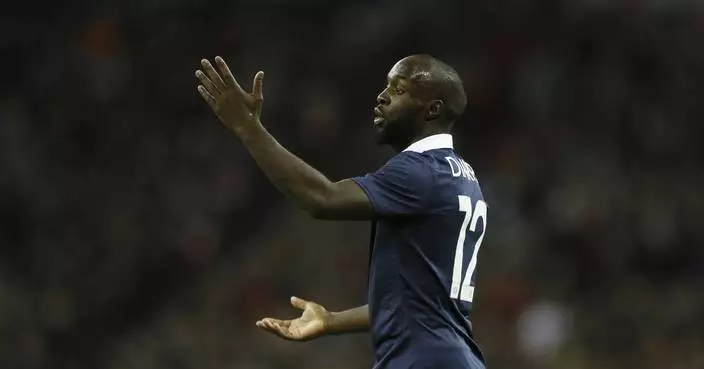The largest gay pride parade in central and eastern Europe brought thousands of people to the streets of Warsaw on Saturday at a time when Poland's LGBT rights movement is the target of a government campaign depicting it as a threat.
Diplomats from the United States, Canada and other Western countries continued a recent tradition of joining the festive Equality Parade to show support for a community experiencing leaps of progress and a backlash around the world.
Click to Gallery
The largest gay pride parade in central and eastern Europe brought thousands of people to the streets of Warsaw on Saturday at a time when Poland's LGBT rights movement is the target of a government campaign depicting it as a threat.
"Not everyone has to go to the Equality Parade but everyone should respect minority rights," Trzaskowski told the crowd from a parade float. "It's really important for me that Warsaw be open, that Warsaw be tolerant."
And on the eve of the parade, a far-right journalist on public television, Rafal Ziemkiewicz, sent chills down the spines of the LGBT community.
"His words are read by hundreds of thousands of people," he said. "It's possible that one of those people will take his word about shooting at LGBT people literally."
Hubert Sobecki, head of Love Does Not Exclude, a group seeking marriage equality, said the situation is particularly frightening for those young people struggling with their sexual identity. He said some are afraid to come out and some straight kids are being bullied because they are perceived as gay.
"There is lots of hate in the public media and by the ruling party, but you also have a growing movement of people realizing we are fighting for our lives," Sobecki said. "This movement is not about luxury or privilege, it's about the privilege of staying alive when you are a teenager. It's about survival."
In a first, the Polish capital's mayor also participated. Opening the parade, Warsaw Mayor Rafal Trzaskowski noted that it is now common for cities across Europe to support LGBT pride marches.
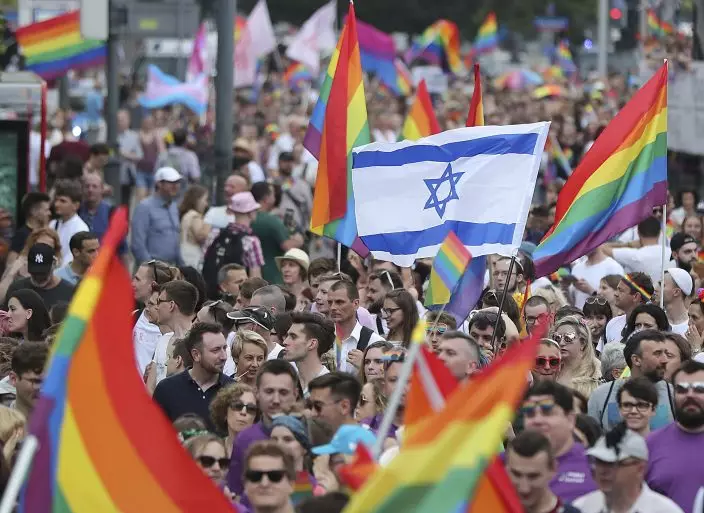
People take part in a gay pride parade in Warsaw, Poland, on Saturday, June 8, 2019. The Equality Parade is the largest gay pride parade in central and Eastern Europe. It brought thousands of people to the streets of Warsaw at a time when the LGBT rights movement in Poland is targeted by hate speeches and a government campaign depicting it as a threat to families and society. (AP PhotoCzarek Sokolowski)
"Not everyone has to go to the Equality Parade but everyone should respect minority rights," Trzaskowski told the crowd from a parade float. "It's really important for me that Warsaw be open, that Warsaw be tolerant."
While many Poles in Warsaw and other cities have increasingly grown supportive of gay rights, a backlash is also underway. In recent months, officials from Poland's right-wing ruling party have portrayed the LGBT rights movement, citing in particular the movement's calls for sex education that stresses tolerance of minorities, as a threat to families, children and society.
Law and Justice party leader Jaroslaw Kaczynski recently called the LGBT rights movement a foreign import that threatened the nation's identity. In conservative areas, town councils have been declaring their municipalities "LGBT free."
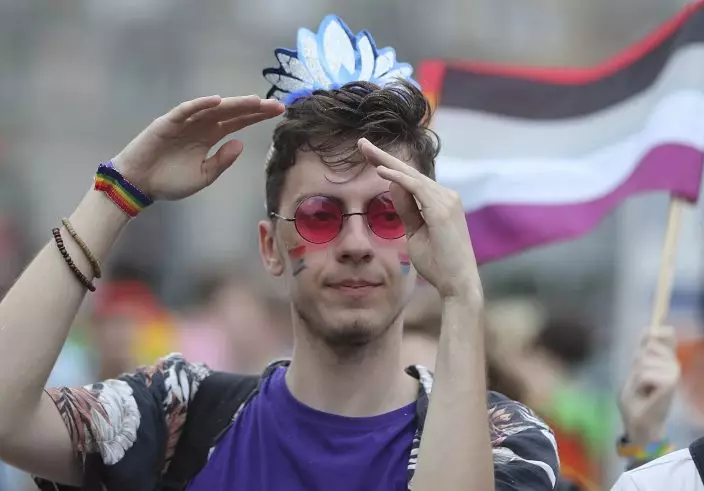
A man takes part in a gay pride parade in Warsaw, Poland, on Saturday, June 8, 2019. The Equality Parade is the largest gay pride parade in central and Eastern Europe. It brought thousands of people to the streets of Warsaw at a time when the LGBT rights movement in Poland is targeted by hate speeches and a government campaign depicting it as a threat to families and society. (AP PhotoCzarek Sokolowski)
And on the eve of the parade, a far-right journalist on public television, Rafal Ziemkiewicz, sent chills down the spines of the LGBT community.
In a tweet, he said "one must shoot at LGBT" people, before adding "not in the literal sense of course — but these are not people of good will or defenders of anybody's rights, (the movement is) a new mutation of Bolsheviks and Nazis."
Slava Melnyk, head of the Campaign Against Homophobia, warned about the possible consequences of such provocative language.
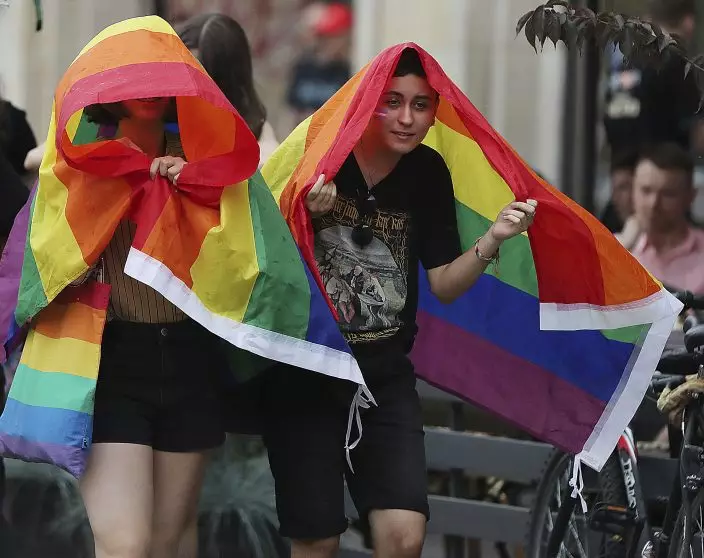
People take part in a gay pride parade in Warsaw, Poland, on Saturday, June 8, 2019. The Equality Parade is the largest gay pride parade in central and Eastern Europe. It brought thousands of people to the streets of Warsaw at a time when the LGBT rights movement in Poland is targeted by hate speeches and a government campaign depicting it as a threat to families and society. (AP PhotoCzarek Sokolowski)
"His words are read by hundreds of thousands of people," he said. "It's possible that one of those people will take his word about shooting at LGBT people literally."
Uschi Pawlik, who was marching with her LGBT Christian group, Faith and Rainbow, described feeling excluded in the conservative and mostly Roman Catholic nation.
"We feel that the government has made a scapegoat of us. Many of us feel excluded by our own country and our own church," Pawlik, 40, said. "So it is painful, but many of us think this is a reason to fight, and not the moment to give up."
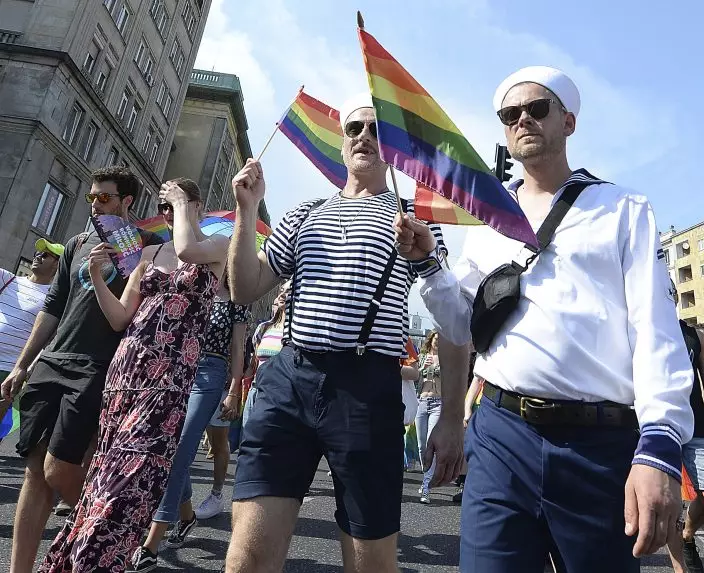
People take part in a gay pride parade in Warsaw, Poland, Saturday, June 8, 2019. The Equality Parade is the largest gay pride parade in central and Eastern Europe. It brought thousands of people to the streets of Warsaw at a time when the LGBT rights movement in Poland is targeted by hate speeches and a government campaign depicting it as a threat to families and society. (AP PhotoCzarek Sokolowski)
Hubert Sobecki, head of Love Does Not Exclude, a group seeking marriage equality, said the situation is particularly frightening for those young people struggling with their sexual identity. He said some are afraid to come out and some straight kids are being bullied because they are perceived as gay.
Call centers have been working to prevent suicides, but they don't always succeed, he said.
Last month a transgender girl killed herself by jumping from a bridge in Warsaw. When a group of people went later with a rainbow flag to the bridge to honor her, they were assaulted.
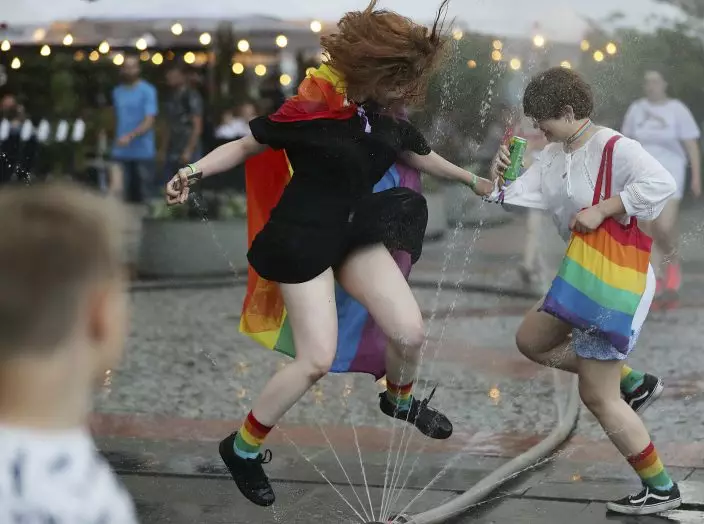
People take part in a gay pride parade in Warsaw, Poland, on Saturday, June 8, 2019. The Equality Parade is the largest gay pride parade in central and Eastern Europe. It brought thousands of people to the streets of Warsaw at a time when the LGBT rights movement in Poland is targeted by hate speeches and a government campaign depicting it as a threat to families and society. (AP PhotoCzarek Sokolowski)
"There is lots of hate in the public media and by the ruling party, but you also have a growing movement of people realizing we are fighting for our lives," Sobecki said. "This movement is not about luxury or privilege, it's about the privilege of staying alive when you are a teenager. It's about survival."
LGBT rights became a key topic of public debate earlier this year when Trzaskowski, from the centrist opposition party Civic Platform, issued an LGBT rights declaration. In one point, it set out the city's commitment to try and help find shelter for gay youth rejected by their parents. In another, he promised to incorporate World Health Organization guidelines on sex and tolerance education into Warsaw's school system.
Poland's education minister, who was sworn in Tuesday, described the LGBT rights declaration as an attempt to groom children for pedophiles and said sex education is the responsibility of families only.

People take part in a gay pride parade in Warsaw, Poland, Saturday, June 8, 2019. The Equality Parade is the largest gay pride parade in central and Eastern Europe. It brought thousands of people to the streets of Warsaw at a time when the LGBT rights movement in Poland is targeted by hate speeches and a government campaign depicting it as a threat to families and society. (AP PhotoCzarek Sokolowski)
By seizing on the issue, the ruling conservatives have managed to energize their base and divide the political opposition.
Law and Justice won an overwhelming victory in elections to the European Parliament last month.
Many in the opposition have concluded that supporting LGBT rights did not help them and are now seeking to back away from that issue ahead of national elections in the fall.
In neighboring Lithuania, an estimated 10,000 people joined a pride parade in the capital, Vilnius. The event took place without incident, a change from the city's first parade in 2008, which included brick throwing and mounted police using tear gas.
In Warsaw, protesters blared loud church music as the parade passed by, but it too, went off without incident.
Warsaw's pride parade is also being answered Sunday with a "March for Life and the Family" in 130 Polish towns. The anti-abortion event will open Sunday with a Mass for children, and the theme this year is protecting children from premature sexualization.
Jari Tanner contributed from Helsinki.
BEIRUT (AP) — The European Union announced Thursday an aid package for Lebanon of 1 billion euros — about $1.06 billion — much of which will go to boost border control to halt the flow of asylum seekers and migrants from the small, crisis-wracked country across the Mediterranean Sea to Cyprus and Italy.
The deal follows other EU aid packages for countries such as Egypt, Tunisia and Mauritania to fortify their borders. It comes against a backdrop of increasing hostility toward Syrian refugees in Lebanon and a major surge in irregular migration of Syrian refugees from Lebanon to Cyprus.
European Union Commission President Ursula von der Leyen said during a Beirut visit with Cypriot President Nikos Christodoulides that the aid distribution will start this year and last till 2027.
The bulk of the aid — 736 million euros — would go to support Syrian refugees “and other vulnerable groups” in Lebanon, while 200 million euros are meant to bolster Lebanese security services in enforcing border and migration control, according to figures provided by the Cypriot government.
An unspecified amount would go to Lebanese fishermen, to discourage them from selling their boats to smugglers.
Von der Leyen said the EU will also work on a “more structured approach to voluntary return" of Syrian refugees "in close cooperation with” the U.N. refugee agency. The bloc will continue to maintain “legal pathways” for resettlement of refugees in Europe, she said.
Lebanon's caretaker Prime Minister Najib Mikati praised the package, saying that “Lebanon’s security is security for European countries and vice versa,” and that an escalation of the crisis ”will not be limited to Lebanon but will extend to Europe."
Lebanon, which has been in the throes of a severe financial crisis since 2019, hosts nearly 780,000 registered Syrian refugees and hundreds of thousands more who are unregistered, the world's highest refugee population per capita.
Lebanese political officials have for years urged the international community to resettle the refugees in other countries or assist their return to Syria — voluntarily or not. Lebanese security forces have stepped up deportations of Syrians over the past year.
Tensions further flared after an official with the Christian nationalist Lebanese Forces party, Pascal Suleiman, was killed last month in what military officials said was a botched carjacking by a Syrian gang. The incident prompted outbreaks of anti-Syrian violence by vigilante groups.
Meanwhile, Cypriot authorities complain the island nation has been overwhelmed by irregular migration of Syrian asylum seekers, many of them coming on boats from Lebanon.
The UNHCR in Lebanon said it had verified 59 “actual or attempted” departures by boats carrying a total of 3,191 passengers from Lebanon between January and mid-April, compared to three documented boat movements carrying 54 passengers in the same period last year. Usually, few boats attempt the much more dangerous crossing in the winter. In all of 2023, UNHCR recorded 65 boat departures carrying 3,927 passengers.
Cyprus has taken a new approach to halting the flow of migrants. Last month, it suspended processing of Syrian asylum applications, and human rights groups accused the Cypriot coast guard of forcibly turning back five boats carrying about 500 asylum seekers coming from Lebanon. Cypriot officials have denied this.
Bassel al-Shayoukh, a Syrian refugee from Idlib living in Lebanon since 2014, said his brother and several cousins and nephews were on one of the boats turned back. Now he wants to make the journey himself.
“In the beginning I thought that in a year or two the war would be over in Syria,” he said, but it dragged on, while in Lebanon “every year ... the situation began to get worse.”
Shayoukh said he fears being beaten by vigilantes or deported to Syria after Lebanese authorities declined to renew his residency permit.
His 17-year-old nephew, who declined to give his name fearing for his safety, said the Cypriot coast guard started making waves to push the boat he was on away. “I was terrified... I don’t know how to swim,” he said. “I thought we were going to die.”
The people on the boats “stayed three days without food or water” before turning back to Lebanon, the teen added.
Back in Lebanon, they were detained by the army; those registered with UNHCR were released and the others deported.
Mohammed Sablouh, a Lebanese human rights lawyer who works on refugee and migrant cases, says Lebanese authorities are deliberately “turning a blind eye" to the surge in migration to "pressure the international community.”
The Lebanese army did not respond to a request for comment on their measures to combat smuggling.
Thursday's aid announcement comes ahead of the annual fundraising conference for the Syrian crisis in Brussels later this month. After 13 years of civil war, donor fatigue has set in while the world’s attention is occupied by the humanitarian fallout of more recent conflicts in Ukraine and Gaza.
The Cypriot president said Thursday was a “historic day” and called for European officials to go farther and declare some areas of Syria safe for return.
“The current situation is not sustainable for Lebanon. It is not sustainable for Cyprus, it is not sustainable for the European Union,” Christodoulides said.
But not all Lebanese officials are convinced the European aid would solve the problem.
Lebanese Forces party head Samir Geagea told The Associated Press earlier this week that European authorities are mainly concerned “that the refugees don’t go to Europe."
"For us the problem is that we cannot have our country drowning in illegal Syrian refugees,” Geagea said, urging for Syrians to be sent back to either government or opposition-held areas of the neighboring country.
But Shayoukh says he has nowhere to go.
The Damascus government wants him for opposing Syrian President Bashar Assad, he said, while the Islamist group that now controls his hometown behaves "the same way as the regime’s intelligence services” in crushing dissidents.
Associated Press writer Menelaos Hadjicostis in Nicosia, Cyprus, contributed to this report.
Follow AP’s global migration coverage at: https://apnews.com/hub/migration

Lebanese caretaker Prime Minister Najib Mikati, center, speaks during his meeting with Cyprus' President Nikos Christodoulides, left, and President of the European Commission Ursula von der Leyen at the government palace in Beirut, Lebanon, Thursday, May 2, 2024. (AP Photo/Hassan Ammar)
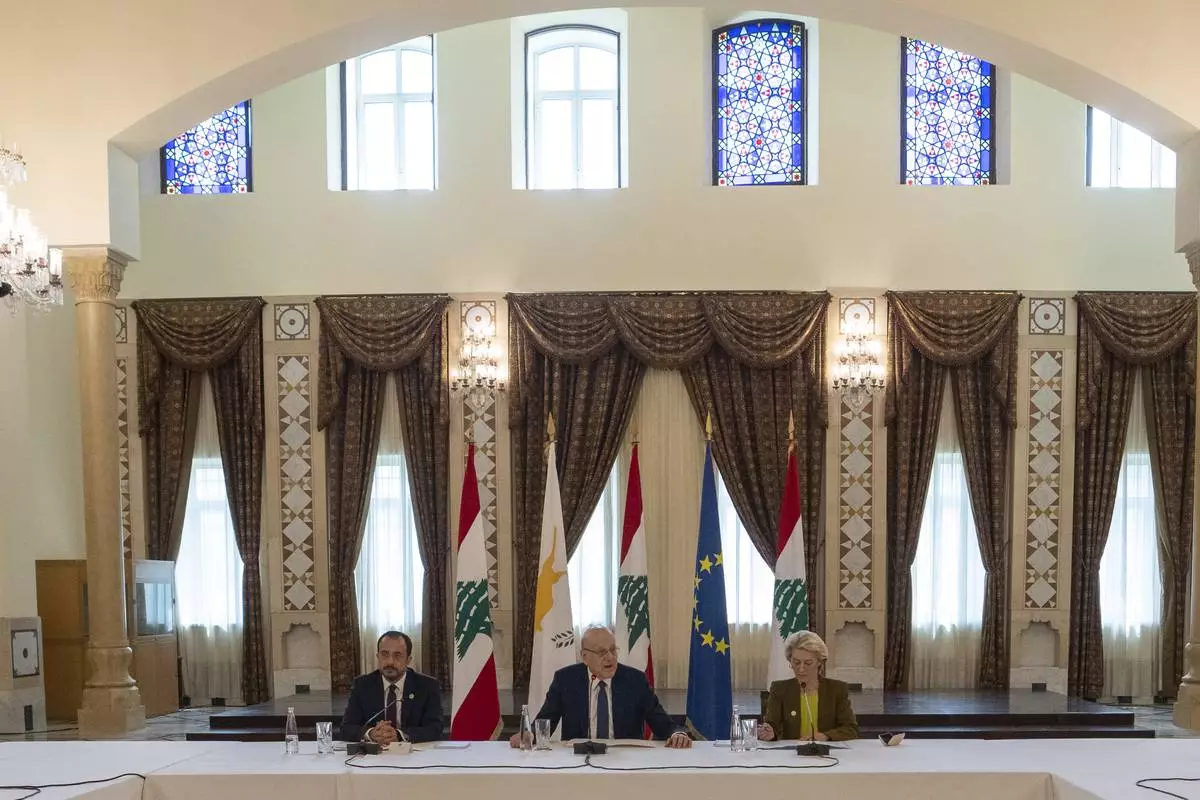
Lebanese caretaker Prime Minister Najib Mikati, center, speaks during his meeting with Cyprus' President Nikos Christodoulides, left, and President of the European Commission Ursula von der Leyen at the government palace in Beirut, Lebanon, Thursday, May 2, 2024. (AP Photo/Hassan Ammar)
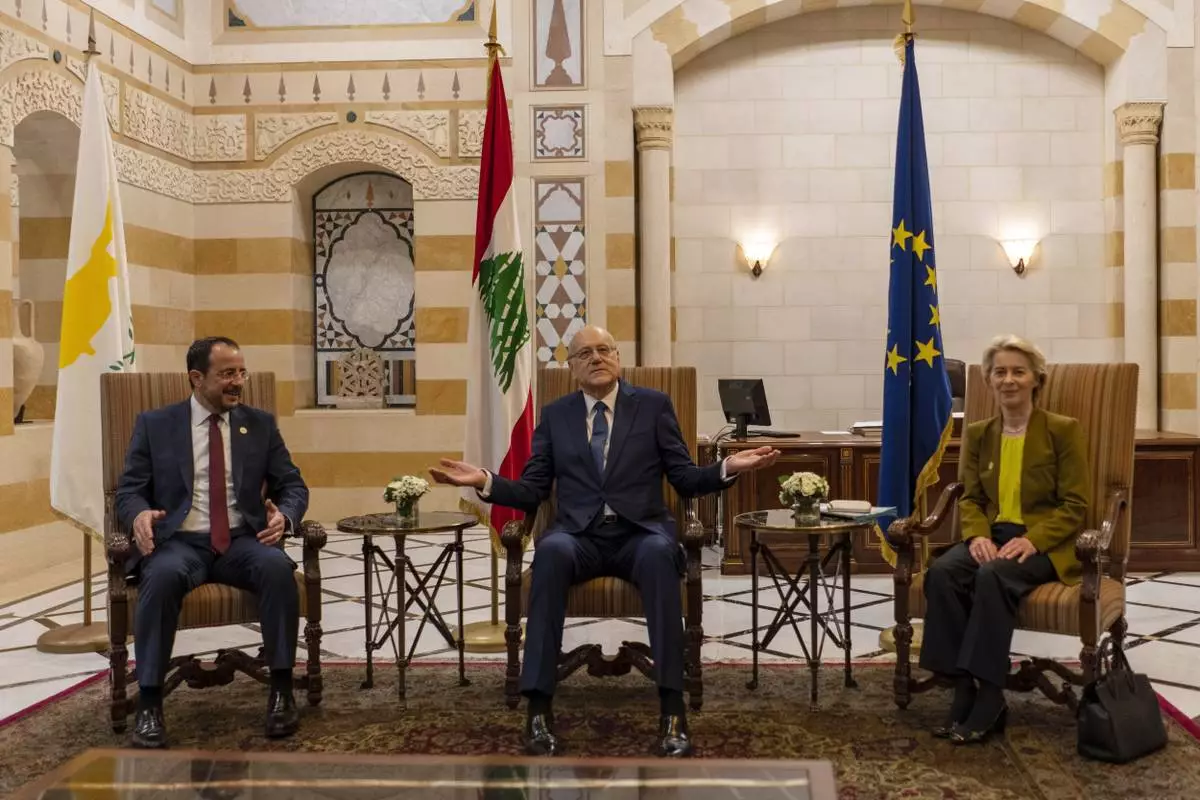
Lebanese caretaker Prime Minister Najib Mikati, center, welcomes Cyprus' president Nikos Christodoulides, left, and President of the European Commission Ursula von der Leyen before their meeting at the government palace in Beirut, Lebanon, Thursday, May 2, 2024. (AP Photo/Hassan Ammar)
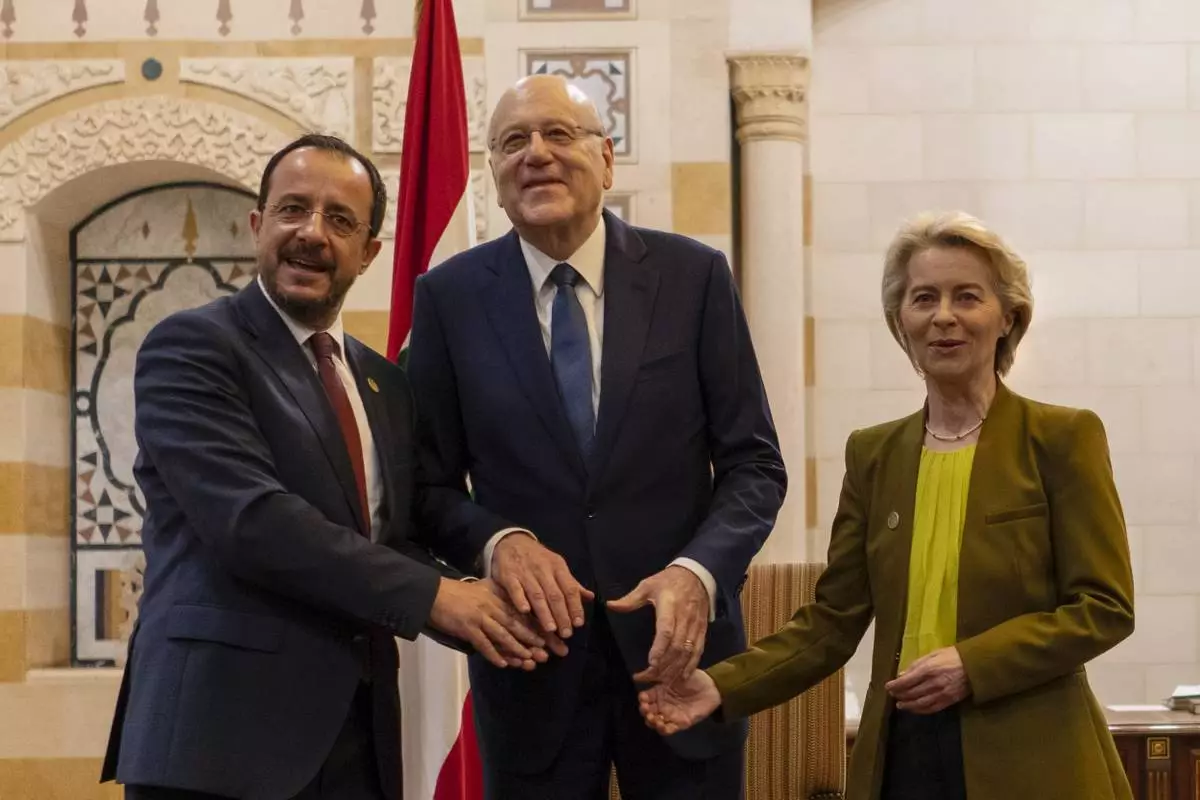
Lebanese caretaker Prime Minister Najib Mikati, center, Cyprus' President Nikos Christodoulides, left, and President of the European Commission Ursula von der Leyen pose for photograph at the government palace in Beirut, Lebanon, Thursday, May 2, 2024. (AP Photo/Hassan Ammar)
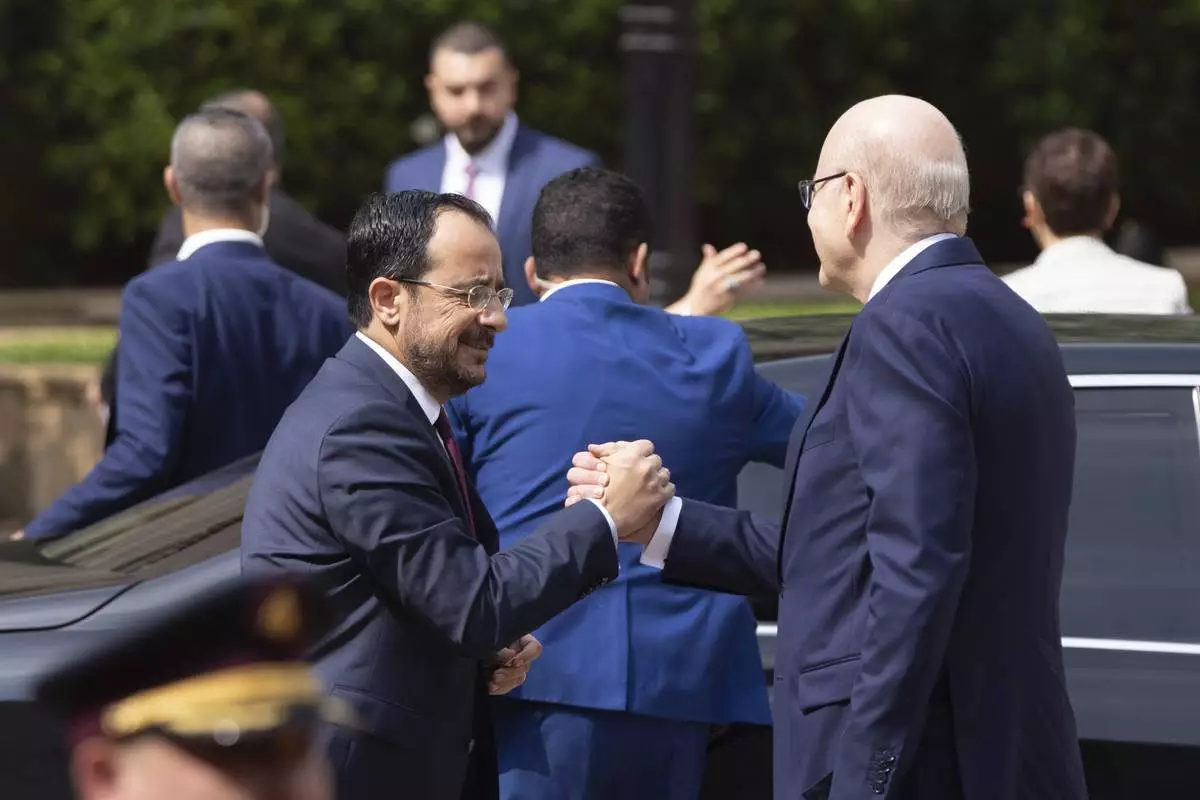
Lebanese caretaker Prime Minister Najib Mikati, right, welcomes Cyprus' president Nikos Christodoulides before their meeting at the government palace in Beirut, Lebanon, Thursday, May 2, 2024. (AP Photo/Hassan Ammar)

Cyprus' President Nikos Christodoulides, left, and President of the European Commission Ursula von der Leyen, center, review an honor guard upon their arrival to meet with the Lebanese Speaker Nabih Berri, in Beirut, Thursday, May 2, 2024. (AP Photo/Hussein Malla)

Lebanese caretaker Prime Minister Najib Mikati, center, speaks during his meeting with Cyprus' President Nikos Christodoulides, left, and President of the European Commission Ursula von der Leyen at the government palace in Beirut, Lebanon, Thursday, May 2, 2024. (AP Photo/Hassan Ammar)
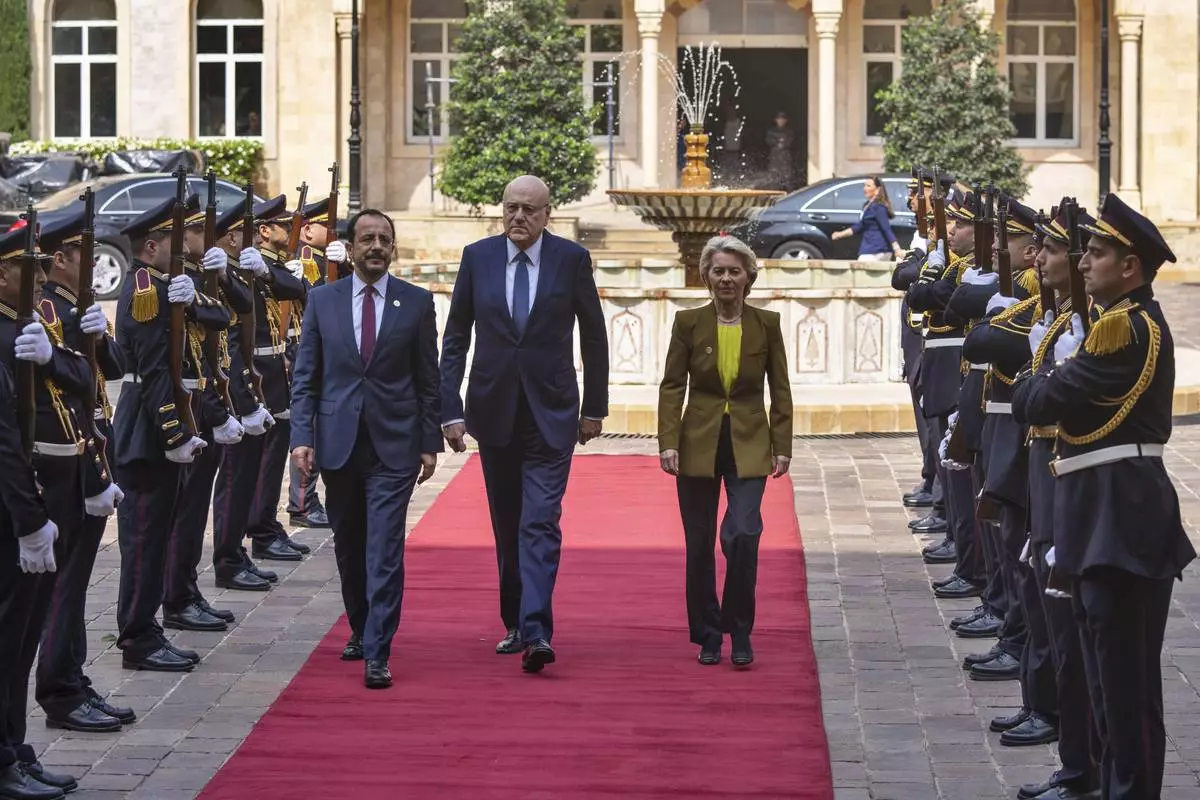
Lebanese caretaker Prime Minister Najib Mikati, center, welcomes Cyprus' President Nikos Christodoulides, left, and President of the European Commission Ursula von der Leyen at the government palace in Beirut, Lebanon, Thursday, May 2, 2024. (AP Photo/Hassan Ammar)

















